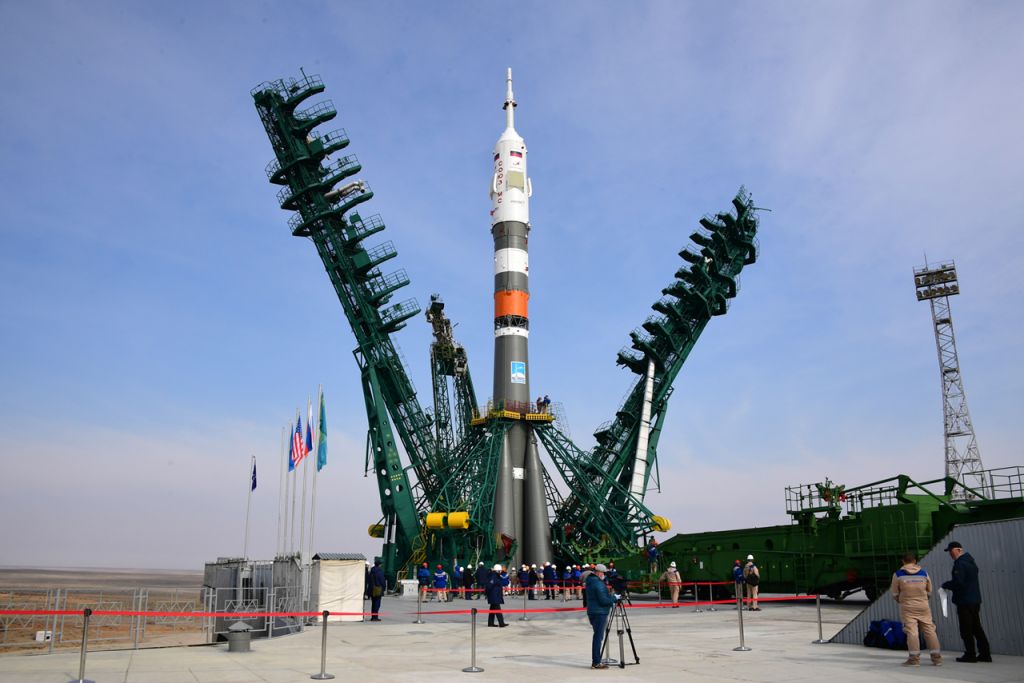Russian space official tests positive for coronavirus after attending Soyuz crew launch to space station
"Potential ISS contamination is absolutely impossible."

A Russian space official has tested positive for COVID-19, the disease caused by the novel coronavirus, but it's "impossible" that any contamination has spread to the International Space Station, Russia's space agency told Space.com.
On April 15, the Russian news agency TASS confirmed that Evegeny Mikrin, the deputy CEO and chief designer at RSC Energia, tested positive for coronavirus.
"Mikrin has passed two tests for the coronavirus and both are positive. He has been included in the list of 30 persons officially declared as infected in Roscosmos (Russia's space agency)," a source told TASS. The source added that Mikrin has, reportedly, not so far shown any clinical symptoms of the disease.
Mikrin was present at the most recent crewed launch to the space station, which launched April 9 from Baikonur Cosmodrome in Kazakhstan. He was seen relatively close to Dmitry Rogozin, the head of Roscosmos, NASA astronaut Chris Cassidy and cosmonauts Anatoly Ivanishin and Ivan Vagner prior to the launch, according to the New York Post.
Related: Soyuz crew 'socially distances' from Earth with launch to space station
However, despite concerns surrounding who Mikrin may have interacted with now that news of his positive diagnosis is public, Roscosmos officials told Space.com that there is no chance that the coronavirus has spread to the space station or among other Roscosmos personnel.
"Potential ISS contamination is absolutely impossible as the number of personnel involved in the related operations has been minimized and those remaining follow the strictest rules and precautionary measures to prevent any possible threat to the crews," the Roscosmos press office told Space.com in an email.
Sign up for the Live Science daily newsletter now
Get the world’s most fascinating discoveries delivered straight to your inbox.
"The same goes about all the Roscosmos staff and those responsible for continuous operations — the number of personnel present at their workplaces has been minimized with most of them working remotely," Roscosmos added. "Others are obliged to follow strictest precautionary measures."
NASA has also weighed in, stressing that both NASA and Roscosmos have taken the appropriate precautionary measures to ensure that all staff from both agencies are as safe from infection as possible.
"Officials from NASA and Roscosmos, and our other international partners, actively discuss the safety and health of their combined teams supporting the International Space Station," NASA press representative Dan Huot told Space.com in an email.
"The astronaut crew was placed in strict quarantine with their medical teams weeks before the launch," Huot said."During this time of social distancing, personal protective equipment and health monitoring procedures were followed to protect the crew from any infectious disease. It is standard NASA practice, as it is with all our international partners, to protect astronauts' health prior to launch and monitor them closely when they first arrive at the International Space Station."
Huot added that NASA will not be sending coronavirus tests to the space station. "The Privacy Rule prohibits us from sharing crew medical information, but NASA is not planning to send coronavirus tests to the space station. NASA maintains a robust pharmacy on board to treat a variety of illnesses on board the space station, but we do not currently have the capability to perform tests for infectious viruses," he said.
- In photos: The Expedition 62 mission to the International Space Station
- Soyuz 'fast track': how 1-day space station trips work (infographic)
- The International Space Station: inside and out (infographic)
Follow Chelsea Gohd on Twitter @chelsea_gohd. Follow us on Twitter @Spacedotcom and on Facebook.
OFFER: Save 45% on 'All About Space' 'How it Works' and 'All About History'!
For a limited time, you can take out a digital subscription to any of our best-selling science magazines for just $2.38 per month, or 45% off the standard price for the first three months.
Chelsea Gohd joined Space.com as an intern in the summer of 2018 and returned as a Staff Writer in 2019. After receiving a B.S. in Public Health, she worked as a science communicator at the American Museum of Natural History. Chelsea has written for publications including Scientific American, Discover Magazine Blog, Astronomy Magazine, Live Science, All That is Interesting, AMNH Microbe Mondays blog, The Daily Targum and Roaring Earth. When not writing, reading or following the latest space and science discoveries, Chelsea is writing music, singing, playing guitar and performing with her band Foxanne (@foxannemusic). You can follow her on Twitter @chelsea_gohd.












